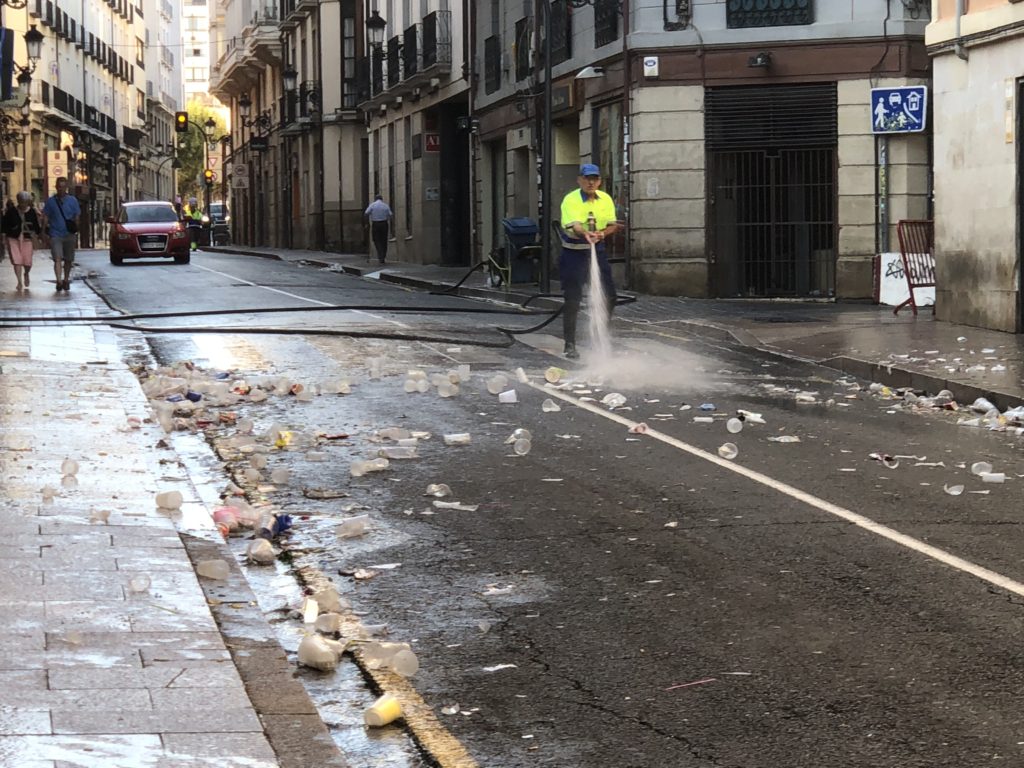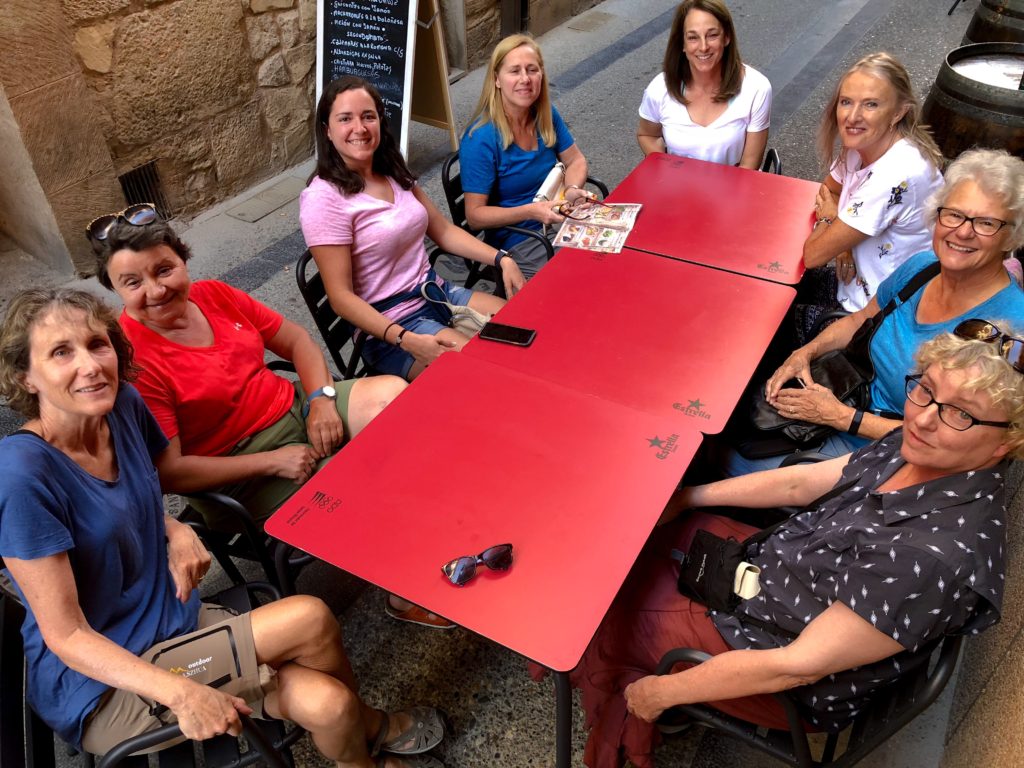
Our booking agent landed us in Viana, a small town of 4,000 in Northern Spain.The village struck us as welcoming. But we quickly experienced an unusual discrimination imposed by a purveyor of tapas. Why? Because two things were true: we did not understand his system, and his regular customers were more important.
We arrived early into the town because our walk was shorter than usual. Church bells struck twelve just as we approached the city. Moving forward and navigating through the narrow streets, we let our hunger guide us to a busy café. Pre-prepared tapas lined its counter. Imagine the pandemonium that hunger can create, not only for us, but also among nearby workers intent on lunch.
Getting to the counter was difficult. Some locals ordered and stayed at the counter to eat. We were in a second-deep row for service. The third line behind us was ordering and getting their treats before us: anchovies, tuna, pocket pastries, and an array foodstuffs so foreign they could have been snails for all I knew.
My eye caught a recognizable shrimp-and-deviled-egg combo, but before the young server would acknowledge me, three plates of the most appealing tapas went, instead, to his favored customers. When his known-by-name customers had their full, Senior Ignore Me pointed at my eyes. In turn, I pointed to some desirable plates and uttered a full-tongued, sharp pronunciation of Coca Cola Zero. I scored four tapas and a cola, which Nancy and I found satiable.
When Nancy asked for another round, I tried to repeat this scenario a second time, only to fail completely. I was front and center, but third-row patrons captured every dish I coveted. Humiliated, we went on to our hotel, where other tapas were present, but less fresh and more expensive.
If nothing else, Viana turned lovely when dinner time arrived. The full force of our eight new friends assembled together around joined tables in a narrow street, one block behind from what we now memorialize as “Tapa Nightmare de Viana.” Our dinner gathering was quiet, and social, and strengthening.
 I was beginning to understand that these people — all booked at the same hotel — were becoming as important as the walk to Santiago itself. Had I found the deeper values I sought as a pilgrim at a table, as opposed to a pathway? Talking to people outside my usual circle?
I was beginning to understand that these people — all booked at the same hotel — were becoming as important as the walk to Santiago itself. Had I found the deeper values I sought as a pilgrim at a table, as opposed to a pathway? Talking to people outside my usual circle?
Just miles away Saturday night, plenty of “social” was rocketing in the streets of a larger city called Logrono. Our travel agent had shortened our stage-six walk (seventh-stage for me and Nancy) to 11.2 miles and put us up in Viana. Getting into Logrono would have required an 18-mile trek. ‘Should our agent not have taken us to the more cosmopolitan city?” I wondered. Was the agent worried about our weary bones or was she more concerned about what she knew was going to be a party going on in Logrono? I secretly toyed with the idea that I might have preferred the larger city for our rest.
We thought a wedding in the small village of Viana had been keeping us up late that night, but in Logrono, a throng of young people had been in the streets celebrating the Festival of San Mateo — thousands packed into the highest-possible density into the plaza and side streets, all seriously under the influence. There would have been no sleeping in that city on a holiday Saturday night. We retroactively thanked the booking agent for the quieter venue.
Dutiful pilgrims, we left Viana at 7:40 a.m. Sunday and headed some six miles by dust over to the larger, urban Logrono. When we hit the older streets of the big city, it was impossible not to notice the broken glass, vomit, urine, and plastic cups. We had been happily ignorant of the powerful music, drink and memory of San Mateo.
We came upon city workers dragging out their high-pressure hoses and driving their mechanical sweepers. A flood of glass and plastic cups put on a flotsam parade in Spanish streets. Gravity and water forced litter and microbes along the curbs to a final sanitary purgatory.
Along the trail later, I heard a young American woman talking to a German man she had met along the trail.
“I didn’t know about the fiesta before I got there, but it was great,” she said, “all those American songs in Spanish. Oh, and I got run over by a policeman. He was running over to some dude to beat him with a night stick.”
That same day, headlines in the local newspaper pictured an elbow-to-elbow crowd of young people, hands in the air, dancing, singing, and anticipating a night sky of fireworks.
Nancy and I had missed all of it, asleep in a town six miles away where the only party consisted of the last remaining guests of a wedding. The straggler wedding guests just talked and laughed into the early morning.
The rest of the day’s pilgrimage was largely uneventful — some would call it boring without a landmark or the sighting of a cow or lamb. When all you do is walk for seven hours, the mere hope of news, current events, or conversation is welcome. Surely, someone would leak information on National Football League scores before the day would end. But no.
The monotony would end instead in Navaratte, a small town with but a single apparent restaurant and a proprietor name Sushanna. No sign of a party there. But one day later, we dragged our feet into Najera, where it wasn’t just the usual siesta keeping stores closed. Another festival was about to begin. The stores would never open during our stay.
“Oh my,” I told Nancy. “Their fiesta is going to be rained out.”
A thunder storm poured buckets on the city. The thunder rolled persistently, not a second of dead air for minutes on end.
The downpour abated by nine o’clock, when well-dressed women contrasted with men in shorts to make their way to the plaza for music, dance, and yet more fireworks. A marching band came around, playing tunes near our hotel. Many celebrants distanced themselves from the from the plaza for a more intimate celebration below our window.
It is hard to complain when people are having a good time. So I embraced the music and conversation, but got worried when two drunken women fought, one backing down to vomit. When the noise subsided, I fell back into a light sleep. The events finally wound down about 6 a.m., just in time for us to wake up in preparation of a 14.6 walk to Santo Domingo.
It was an unusual series of events, but news of the parties should not be interpreted as any disparagement of Najera. Our stay was lovely, and we left with good feelings. We found our way to Santo Domingo and settled down for a Pilgrim’s meal, when what should parade down the street? Another marching band.
Seems like we’re groupies following all the local parties in Northern Spain.
Fascinating account, Ted – Thank you.
Highlights the issue the rest of us have when a guy three rows deep orders a beer at the Purple Place.
Cheers.
Exactly. I feel sorry for those guys, then ask for some sliders for myself.
Thank you for the story. First third made me want to walk the Camino. The rest, not so much. Hope you and Nanc are loving your experiences can’t wait to hear more when you get back.
Thank you Ted for all the great stories!Im really enjoying this adventure that you two are sharing wirh us! Hats of to you!